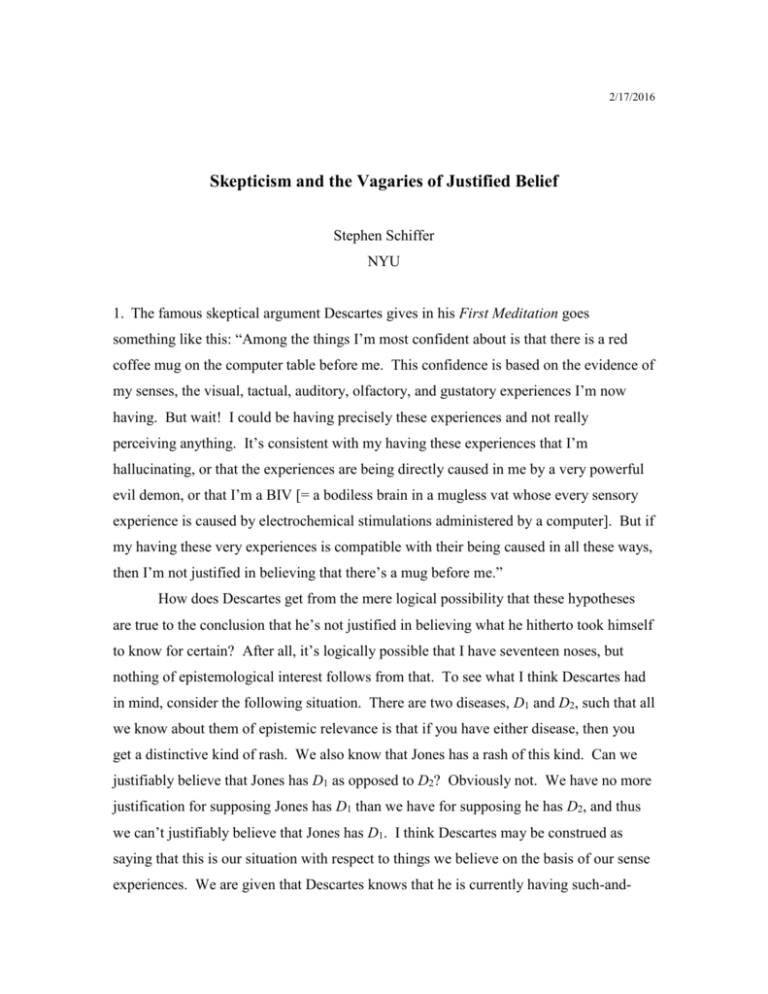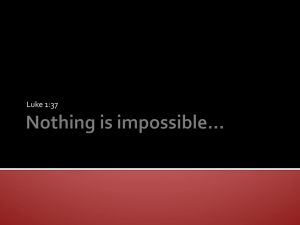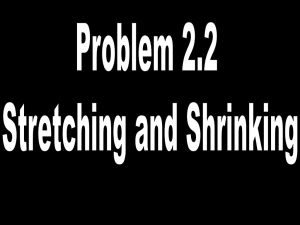Word Document
advertisement

2/17/2016 Skepticism and the Vagaries of Justified Belief Stephen Schiffer NYU 1. The famous skeptical argument Descartes gives in his First Meditation goes something like this: “Among the things I’m most confident about is that there is a red coffee mug on the computer table before me. This confidence is based on the evidence of my senses, the visual, tactual, auditory, olfactory, and gustatory experiences I’m now having. But wait! I could be having precisely these experiences and not really perceiving anything. It’s consistent with my having these experiences that I’m hallucinating, or that the experiences are being directly caused in me by a very powerful evil demon, or that I’m a BIV [= a bodiless brain in a mugless vat whose every sensory experience is caused by electrochemical stimulations administered by a computer]. But if my having these very experiences is compatible with their being caused in all these ways, then I’m not justified in believing that there’s a mug before me.” How does Descartes get from the mere logical possibility that these hypotheses are true to the conclusion that he’s not justified in believing what he hitherto took himself to know for certain? After all, it’s logically possible that I have seventeen noses, but nothing of epistemological interest follows from that. To see what I think Descartes had in mind, consider the following situation. There are two diseases, D1 and D2, such that all we know about them of epistemic relevance is that if you have either disease, then you get a distinctive kind of rash. We also know that Jones has a rash of this kind. Can we justifiably believe that Jones has D1 as opposed to D2? Obviously not. We have no more justification for supposing Jones has D1 than we have for supposing he has D2, and thus we can’t justifiably believe that Jones has D1. I think Descartes may be construed as saying that this is our situation with respect to things we believe on the basis of our sense experiences. We are given that Descartes knows that he is currently having such-and- such sense experiences. For him to conclude on the basis of this that there’s a mug before him is for him to accept a certain hypothesis about the cause of his experiences. But that very same evidence, which is all the evidence he has to go on, is equally well explained by alternative and incompatible hypotheses: the hallucination hypothesis, the evil demon hypothesis, the BIV hypothesis, and so on. He’s in the same sort of epistemic situation we’re in with respect to trying to find out whether Jones has disease D1 or disease D2. Let’s give this argument the following restatement: [A] (1) If two incompatible hypotheses H and H equally well explain evidence E, then E provides no more reason for believing H than it does for believing H. (2) My present sensory experience is equally well explained by the incompatible hypotheses that I’m really perceiving that there is a mug before me and that I’m a BIV. (3) My present sensory experience is the only evidence I have for evaluating these competing hypotheses. (4) I have no more reason to believe that I’m really perceiving that there’s a mug before me than that I’m a BIV. (5) If (4), then I’m not justified in believing that there’s a mug before me. (6) I’m not justified in believing that there’s a mug before me. I think most epistemologists nowadays would protest that [A] presupposes a radically false account of what is required in order for our ordinary perceptual beliefs— such as one’s belief that there’s a mug before one—to be justified. The false, presupposed account holds that the fact that one is currently having the sense experiences one is having constitutes one’s evidence for the empirical proposition one believes—in this case, the proposition that there’s a mug before one—and one takes this fact to be good evidence for the proposition because the fact is entailed by that hypothesis which one thinks is the best explanation of the fact. The false picture, it will be said, supposes that the kind of justification I have for believing that there’s a mug before me is like the kind of justification I have for believing that my child has measles when I infer this from 2 the nature of the spots on his body. The false picture presupposed by [A] sees me as making an inference to the best explanation from the fact that I seem to see that there’s a mug before me to the explanation that I seem to see that there’s a mug before me because I really do see that there’s a mug before me. Then the argument [A] kicks in to show that, owing to the competing skeptical hypothesis, I’m not warranted in making my inference, and am therefore not justified in believing that there’s a mug before me. If that is the false account of what it takes for one’s perceptual beliefs to be justified, what is the correct account, the account that tells us how our perceptual beliefs are in fact justified? My sense is that most epistemologists nowadays would respond in part to this question in the following way. They would claim that my belief that there’s a mug before me isn’t based on any proposition I take to be my evidence or reason for believing that there’s a mug before me. Rather, in the normal case, such as my present belief that there’s a mug before me, what justifies me in believing that there’s a mug before me is my merely having the sense experience which causes me to believe that there’s a mug before me. I am non-inferentially justified in believing that there’s a mug before me. Sensory experience makes my belief justified, but not by providing the premises for an inference to the best explanation of the causes of that experience; it’s the mere having of the experience that renders the belief justified. I don’t make any kind of inference to the conclusion that there’s a mug before me, and I don’t believe that there’s a mug before me on the basis of believing that I’m having such-and-such sense experience. I have the sense experience and that both causes me to believe, and, all other things being equal, justifies me in believing, that there’s a mug before me. A belief that there’s a mug before one, like a belief that one is conscious, is a belief that can be justified even though it’s not based on some further belief which is its justification. 2. The ‘all other things being equal’ snuck into my gloss of what most philosophers would say hints at why the claim I just put into their mouths can’t be the whole story of what justifies me in believing that there’s a cup before me. My justified belief that there’s a mug before me is defeasible. Suppose that I seem to see that there’s a mug before me and am thereby led in the standard way to believe that there’s a mug before me, but that Smith suspects that I may be the victim of a hoax involving a hologram of a 3 red coffee mug (you can fill in the details). She certainly won’t take me to be fully justified in believing that there’s a mug before me unless I have independent reasons for thinking that what I’m looking at isn’t a mere hologram. Once the question is raised, I can’t even argue to myself, “Well, I’m completely justified in believing that there’s a mug before me, and thus, owing to the obvious entailment, I’m completely justified in believing that I’m not looking at a mere hologram of a mug.” If I’m now to be fully justified in believing that there’s a mug before me, I must have a justification for believing that I’m not looking at a hologram which justification isn’t simply the senseexperience-provided justification I originally had for believing that there’s a mug before me. If this is correct, what is it about the claim that I’m not looking at a hologram of a mug which requires an independent justification for believing it? After all, the hypothesis that there isn’t a mug before me is consistent with the justification provided by my sense experience for thinking that there is a mug before me, but we don’t take that alone to show that the sense experience doesn’t justify me in believing that there’s a mug before me. The answer, or the better part of it, should be clear: if it were merely the case that, in the normal way, there wasn’t a mug before me, then I wouldn’t now seem to see that there’s a mug before me and wouldn’t now believe that there’s a mug before me; but we may suppose that the details of the hologram hypothesis are such that I would still have the experience and the belief if I were looking at a hologram of a mug. One needs, it would seem, an independent justification for disbelieving a potentially defeating hypothesis when one would have the justification one actually has if that hypothesis were true. Parity of reasoning suggests that just as I need an independent justification for believing that I’m not looking at a hologram, at least once that skeptical hypothesis has been raised, so, too, I need an independent justification for believing that I’m not a BIV, at least once that skeptical hypothesis has been raised. After all, the moral of the hologram hypothesis seems to be that one needs an independent justification for disbelieving a potentially defeating hypothesis when one would have precisely the justification one actually has if that hypothesis were true, and that is evidently just as true of the BIV hypothesis as it is of the hologram hypothesis. All this suggests the following further reconstruction of the skeptical argument: 4 [B] (1) I’m not fully justified in believing that there’s a mug before me unless I have a justification for believing that I’m not a BIV which goes beyond whatever justification is provided by my current sensory experience. (2) I have no such justification. (3) I’m not fully justified in believing that there’s a mug before me. [B] presents a paradox: each premise seems to some degree creditable when considered on its own, but the two together entail a conclusion we’re apt to feel has got to be false. 3. Should we respond to [B] with the following conjunction of claims? i. Sentence types of the form (a) x is fully justified in believing that S don’t express complete propositions, even when they contain no explicit indexicals or demonstratives, and distinct utterances of the same (a)-sentence, at the same time, can express distinct propositions that differ in truth-value, even when the sentence uttered either contains no indexicals or demonstratives or all explicit indexicals and demonstratives have the same referents in the two utterances. ii. When two such utterances of the same sentence differ in truth-value, it’s because what counts as being fully justified differs from one utterance to the next, the false proposition expressed demanding more for being fully justified than is demanded by the true proposition expressed. iii. Thus, the argument-type [B] expresses no context-independent argument, because none of its steps expresses a context-independent proposition. However, there are semantic mechanisms at work which in certain types of contexts demand a standard for justified belief which makes it impossible to be fully justified, by that standard, either in believing that one isn’t a BIV or in believing that there’s a mug before one. One such context is when a skeptical hypothesis like the BIV hypothesis has been made salient. Thus, a typical token of [B] will express a sound argument. 5 iv. At the same time, this sound argument strikes us as paradoxical because the proposition expressed by its conclusion is conflated with the proposition that would be expressed by that sentence in more quotidian circumstances, where skeptical hypotheses aren’t salient, and in those quotidian contexts an utterance of (3) would be false. No, I don’t think we should respond to [B] with (i)-(iv). I have no trouble accepting (i). Owing to vagueness, there are hardly any sentence types that express propositions. This is because the penumbras of vague terms are highly context sensitive, dilating or constricting according to the communicative intentions of the speaker. This is especially true of the vague terms of epistemic evaluation. I can also accept (ii), at least as regards subjective justification, for in a context in which nothing hangs on it, I might count as being justified in believing that your spouse is fooling around, but in another context in which a lot hangs on it, the same evidence might not count as justifying the belief. But I don’t think this kind of context sensitivity bears in any interesting way on the classical skeptical paradox. There are vague sentences that can be taken to say something true in some contexts and something false in others. For example, in certain contexts Harold would be regarded as a solid borderline case of a bald man, but in a context where we’re having a Yul Brynner look-alike contest, we might say ‘He’s not bald’ and be counted as speaking truly, whereas if we’re considering introducing Harold to Betty, we might say ‘No, he’s bald; she only likes guys with luxurious heads of hair’ and be counted as speaking truly. But for most vague notions, there are certain sentences that express determinate truths in every context. ‘Tom Cruise isn’t bald’ is such a sentence, and so is ‘He’s bald’ said of someone for whom no hair at all can grow on his scalp. I think that most people, prior to their introduction to skeptical arguments, would regard a normal person’s belief that there was a mug before her as a paradigm example of a fully justified belief, so that the sentence ‘Normal Mary is fully justified in believing that there’s a mug before her’ would count as expressing a determinate truth in every context. I think (iii) and (iv) are the culprits. One very striking problem with (iv) is that it seems to commit one to saying that in quotidian contexts one would be fully justified in believing that one wasn’t a BIV, but the contextualist proposal does nothing to tell us 6 how there is ever a justification for believing that one isn’t a BIV.1 The implication about quotidian contexts is carried by the claim that in such contexts one would be fully justified in believing that there was a mug before one together with a seemingly undeniable closure principle—namely, if a standard of justification secures that one is fully justified in believing [p & p q], then that same standard secures that one is fully justified in believing q (at least if one makes the obvious inference). But are we to suppose that by the standard in play in the quotidian context one is justified in believing that one isn’t a BIV simply by virtue of seeming to see that there is a mug before one? If so, then that merely succeeds in begging the question posed by the skeptical challenge, since the premises of the skeptical argument [B] in effect entail that one can never be justified in believing that one isn’t a BIV. Someone who takes the skeptic’s argument seriously and is shaken by it doesn’t, and shouldn’t, react by saying, “Wow, I see that I may not now be fully justified in believing that there’s a mug before me, though I recognize that in ordinary contexts a different standard of justification will be in play and by this standard I will be fully justified.” No; one who takes seriously the idea that the skeptic’s argument might be sound will wonder if she ever has any justification at all for her perceptual beliefs; she won’t suppose there are any safe contexts where the standards change. To be sure, she’ll continue to speak with vulgar, just as Hartry Field, a fictionalist about numbers, did when he helped his young daughter learn arithmetic, but that’s not the same as actually believing that one is literally speaking the truth when one says in those contexts, ‘I’m fully justified in believing there’s a mug before me’. After all, as I already said, the upshot of the skeptic’s argument is that there is no justification at all for believing that there’s a mug before one, since one has no better reason whatever for believing that than one has for believing that one is a brain in a mugless vat. If there is a relaxed standard of justification at play in quotidian contexts, then that would already be a rebuttal of the skeptic. The problem with (iii) is that commonsense rebels against the idea that one isn’t fully justified in believing that there’s a mug before one just because in addition to looking at a very salient mug one is also contemplating a skeptical hypothesis. As I sit writing these words on my computer I’m both thinking about the BIV hypothesis and 1 Cf. Kornblith (2000). 7 drinking coffee from a mug by my hand on my computer table. I can assure you, when I reach for the mug I fully believe that I’ll make contact, and fully believe that I’m fully justified in believing that. 4. Some philosophers, such as Tim Williamson (2000) and John McDowell (1998a), would respond to [B] by denying its first premise in the following way. It’s false, they would say, that one would have the justification one actually has for believing that there’s a mug before one if one were a BIV. This is because what actually justifies one in believing that there’s a mug before one is the fact that one is having sense experience with a certain etiology, an etiology that takes into account the causes of the experience, and one wouldn’t have experience with that etiology if one were a BIV. McDowell puts the point by saying that “an appearance that such-and-such is the case can be either a mere appearance or the fact that such-and-such is the case making itself perceptually manifest to someone” (386-7). I don’t find this response plausible. Evidently, and putting Putnamian worries aside, if I’m actually justified in believing that there’s a mug before me, then I would also be justified in believing it if I were a BIV, and what would justify me in that case is the fact, to put it in McDowell’s terms, that I am having an appearance that there’s a mug before me—no matter whether the appearance I’m enjoying is a “mere appearance” or the real McCoy making itself “perceptually manifest” to me. Since I’m having an appearance that there’s a mug before me whether I’m a BIV or really perceiving a mug, there is a justification for believing that there’s a mug before me which I have in either case. What the proponent of the response under consideration would have to say is that my actual justification for believing that there’s a mug before me is over-determined. There is one justification I have which I would have even if I were a BIV, but there is another which I wouldn’t have if I were a BIV, and it’s this justification that shows premise (1) to be false. But isn’t this tantamount to saying that one justification I actually have for believing that there’s a mug before me which I wouldn’t have if I were a BIV is that my belief was produced in me in a way that secures its truth? This strikes me as ad hoc, given that I already have the internalist justification common to the actual case, as we suppose it to be, and the case as it would be if I were a BIV. 8 5. Jim Pryor (2000) proposes a response to [B] he calls “dogmatism,” even though he accepts it. Let’s distinguish between skeptical defeaters—the dream, evil demon, BIV, etc. hypotheses, and ordinary defeaters—the painted mule, the barn façade, the hologram, etc. hypotheses. Now suppose that I believe p as a result of certain sense experience, that S is a skeptical defeater with respect to my believing p, and that O is an ordinary defeater with respect to my believing p. Perhaps p = the proposition that there’s a mug before me, S = the hypothesis that I’m a BIV, and O = the hypothesis that I’m merely looking at a hologram of a mug. S and O are alike in that if either were true, I would still believe p with exactly the same justificatory basis as I actually have. According to the dogmatist, once O is raised, I’m not fully justified in believing p unless I have a justification for disbelieving O that goes beyond the sense experience which leads me to believe p. If I’m to be justified in disbelieving O, then I need a justification for disbelieving it that is independent of the prima facie justification my sense experience provides me for believing p. But the dogmatist also holds that, despite S’s parity with O, once it’s raised, I’m not required to have a justification for disbelieving it that goes beyond the sense experience which leads me to believe p. Even when the BIV hypothesis is made salient, my current sense experience (plus my being fully justified in believing that no ordinary defeater is true) fully justifies me in believing that there is a mug before me, even though I have no independent, or conceptually antecedent, justification for believing that I’m not a BIV. But what explains this remarkable asymmetry? Even if our concept of justified belief makes this invidious distinction between S and O, perhaps we should wonder whether it should. Maybe we should change the way we speak, given the parity between S and O.2 The dogmatic position is apt to strike us as unilluminating special pleading if its differential treatment of skeptical and ordinary defeaters is based simply on the fact that, whereas we might have independent justification for disbelieving an ordinary defeater, no such independent justification is possible for a skeptical defeater. This can hardly be a satisfying resolution of the paradox the skeptical argument [B] provides. 2 McDowell is making this sort of point when he rightly complains that responses to skepticism which appeal to conventions about how we talk about justification “are quite unsatisfying. Without showing that the ‘conventions’ are well founded, we have no ground for denying that the concession to the sceptic is an admission that we have reason to change the way we talk” (1998, p. 373, fn. 8). 9 Besides, no reasonable dogmatist will deny that one is justified in believing that one isn’t a BIV, but dogmatism, as so far presented, gives no account of the nature of that justification. The dogmatist denies that one needs an independent justification for believing that one isn’t a BIV in order to be justified in believing that there’s a mug before one. Is this supposed to suggest that we don’t have such an independent justification? Am I supposed to be justified in believing that I’m not a brain in a mugless vat because I deduce that from the proposition that there’s a mug before me, which I’m fully justified in believing? One problem with this idea is that I was apparently justified in believing that I wasn’t a BIV even before there was a mug before me. Another is that it’s arguable—though by no means obvious3—that the attempt to justify my believing that I’m not a BIV via the inference There is a mug before me. Therefore, I’m not a brain in a mugless vat. will suffer from what Crispin Wright and Martin Davies have called a failure to transmit warrant.4 According to them, closure applies, in that I’m fully justified in believing the conclusion of the displayed inference given that I’m fully justified in believing both that the inference is valid and that its premise is true. But they would say, with I think some plausibility, that warrant can’t be transmitted from the premise to the conclusion, when one’s justification for believing the premise is the fact that one is having certain sense experiences, because one’s being justified on the basis of those experiences presupposes that one is already justified in believing the conclusion, so the inference is questionbegging when presented as an attempt to justify belief in its conclusion. At the same time, the idea that we have a justification that is independent of the justifications sense experiences provide for our perceptual beliefs is hard to accept. If there is such a justification, it’s evidently some sort of a priori “entitlement” as advocated by, e.g., Tyler Burge (1993), but the idea that we have an a priori justification for believing contingent propositions such as that I’m not a BIV, but not for the contingent proposition that I’m not the victim of a hologram hoax, strikes me as both wishful thinking and special pleading. Nevertheless, I think the Burgean response to [B] may in 3 4 Jim Pryor argues against it in his (2001). See e.g. Wright (1991) and Davies (1998). 10 a certain sense (though not the sense intended by Burge) be the appropriate response. I’ll explain. 6. Common sense rebels against the thought that [B] is sound. If no one is ever completely justified in believing that there’s a mug before her, then no one is ever completely justified in believing any empirical proposition that goes beyond one’s current sense experience, and if that’s so, then no one is ever in a position to assert such a proposition. Besides, as Hume pointed out long ago, it’s a good bet that we are so built as information processors that it’s impossible for us not to believe those propositions about the external world we pretheoretically feel certain we know.5 And I doubt we have any use for a notion of justified belief which allows us to say that we’re not fully justified in believing the propositions we fully believe. I also doubt we have any use for a notion of justified belief which allows one to be fully justified in believing that there’s a mug before one but not in believing that one isn’t a brain in a mugless vat.6 Assuming that the conclusion of [B] is false, which of its premises is false? I think the best response to this question would take premise (2) to be the culprit, and would continue in the following vein. One can’t have evidence or reasons for believing that one isn’t a BIV in the way one can have evidence or reasons for believing that one isn’t looking at a hologram of a mug or that one isn’t looking at a mule cleverly disguised to look like a zebra. Nevertheless, one is justified in believing that one isn’t a BIV. What makes one’s belief that one isn’t a BIV justified is that the proposition that one isn’t a BIV is presupposed by all those beliefs based on sense experience that we can’t help believing and that we pretheoretically feel confident we know, those propositions that are undefeated by ordinary defeaters. The same is true for all the famous all-embracing skeptical hypotheses, such as Descartes’ dream and evil demon hypotheses. One is justified in believing that these skeptical hypotheses are false because the assumption that one is justified is a precondition for one’s having any justified beliefs about the external world. I’m indebted to John Hawthorne’s (forthcoming) for reminding me of Hume’s prescient pronouncement and for pointing out, along with Williamson (2000), the way knowledge is the norm for assertion. 6 Cf. Keith DeRose’s (1995) “abominable conjunction.” 5 11 You may have noticed my caginess. I didn’t say that [B]’s second premise was determinately false. I said that saying that it was false was what one should say if one’s to say that the conclusion is false. The reason for my caginess is that I don’t think premise (2) can be shown to be false in the way that something can usually be shown to be false when it’s determinately false. Usually when a proposition is determinately false, it’s falsity can be established by appeal to the concepts that individuate the proposition together with other propositions we know to be true. That isn’t the case with premise (2), and I’ll try to explain why. 7. Classical skeptical arguments constitute paradoxes, sets of apparently mutually incompatible propositions each one of which appears plausible when viewed on its own. The premises of [B] and the negation of its conclusion comprise such a set. A happy-face solution to a paradox does two things, assuming that the propositions comprising the set really are mutually incompatible: first, it identifies the odd-guy-out, the member of the set that’s not true; and second, it shows us why this spurious proposition deceived us, strips from it its patina of truth, so that we’re not taken in it by it again. The paradox of the barber who shaves all and only those who don’t shave themselves has a happy-face solution, for all sense of paradox disappears once we see that the existence of such a barber is logically impossible. But it’s my view that some classical philosophical paradoxes—for example, the problem of free will and the sorites—don’t have happy-face solutions, and I believe that the paradox that [B] provides also fails to have a happy-face solution. When a paradox lacks a happy-face solution it’s because there’s a certain kind of glitch in the concept, or concepts, generating the paradox. Aspects of the concept’s underived conceptual role—the conceptual role the concept has regardless of whatever propositional attitudes one happens to have—are in tension, pull us in different directions, and there is nothing else in the concept or elsewhere to resolve that tension for us. Possessors of the concept can feel the tension to varying degrees, and they can react to it in various ways. Consider that paradox we call the problem of free will. Here the paradox consists in the prima facie plausibility of each of three mutually incompatible propositions: (i) that we have free will, i.e., that at least some of the things we do we do 12 freely, of our own free will; (ii) that everything we do is such that we were caused to do it by factors over which we had no control, perhaps factors that obtained even before we were born; and (iii) that (i) is false if (ii) is true. For each of (i)-(iii) there is a classical “solution” to the problem of free will which deems it the odd-guy-out. Where each of these would-be happy-face solutions fails is in explaining away the plausibility of its chosen odd-guy-out. Philosophers have been debating the problem of free will for centuries, and they are still debating it, with philosophers lined up behind each of the solutions in logical space. If the problem of free will had a happy-face solution, I think we would have heard about it by now. As David Hume observed in connection with a different issue, one should suspect that “an hypothesis, so obvious, had it been a true one, would, long ere now, have been received by the unanimous suffrage and consent of mankind” (1751/1957, p. 98). I submit that the problem of free will has no happy-face solution because of a tension in the underived conceptual role of that concept. One aspect of the concept inclines us to apply the concept to certain paradigm cases, acts that are free if any are, whereas another aspect of the concept disinclines us to apply the concept to an act when we learn that the actor was caused to do what she did by factors over which she had no control. Further, there is nothing in the concept or elsewhere—no conceptual court of appeals—to resolve the tension by pronouncing one inclination legitimate, the other illegitimate. It’s not that the concept of free will is inconsistent, like the concept of a round square, for we don’t regard each inclination as providing its own necessary condition for the correct application of the concept. Moreover, different possessors of the concept of free will can feel the tension to varying degrees, as can one person from one moment to the next, and people can react to the tension in different ways. For example, there can be three people who agree that, for the reasons just laid out, the problem of free will can’t have a happy-face solution, but then go on from there in three different directions. One guy decides that for this, that or the other reason, he’ll henceforth be a consistent compatibilist, content to say that an act was freely done when the agent was caused to perform the action by unpathological propositional attitudes. A second guy decides that it’s never fair to hold someone morally responsible for something he was caused to do by factors over which he had no control, even when the propositional 13 attitudes the actor was caused to have are ones we deem rational and unpathological. And a third guy, with whom I’m inclined to side, says that intelligent adults have no need for any notion of free will or moral responsibility. Here is what I think is going on with the skeptical paradox [B] provides. There is a glitch in our concept of epistemic justification. One aspect of the underived conceptual role of that concept tells us that ordinary perceptual beliefs are a bench mark for fully justified belief. But another aspect tells us that a perceptual belief is fully justified only if a we have an independent justification for disbelieving a potentially defeating hypothesis such that we would have the prima facie justification we actually have for our perceptual belief even if that hypothesis were true. We then realize that we can have no such independent justifications for the all-embracing skeptical hypotheses; hence the skeptical paradox [B] provides. But it’s unthinkable to us that we should stop believing and asserting propositions like the proposition that there’s a mug before me or the proposition that I have hands. We also recognize that it’s absurd to suppose we can be fully justified in believing that we have hands while not being fully justified in disbelieving that we’re handless brains in vats. Given this, what should we then say about the justificational status of our belief in the falsity of these skeptical hypotheses? What I said above is my answer to this question. We should continue to believe, and continue to reckon ourselves justified in believing, the things we can’t help believing, and simply count ourselves as justified in believing whatever is presupposed by the things we can’t help believing. There is another way of getting at my view. Suppose that our reaction to [B] was that it was, alas, sound, given the concept of justified belief we actually have. What would we then do? Would we stop saying or believing such things as, “Watch out! There’s a car coming.” I don’t think so. But then we would want some way of marking the difference between what it’s kosher to say and think and what it’s unkosher to say and think. We would be forced, I submit, to put our disbeliefs about skeptical hypotheses on the kosher side, and what would give them that status, I further submit, is that (a) we can have no independent evidence for the falsity of these hypotheses and (b) their falsity is presupposed by the propositions of the kind we can’t stop saying and thinking. 14 8. Elsewhere I have distinguished between weak and strong unhappy-face solutions to paradoxes.7 An unhappy-face solution says that it’s owing to a specified glitch in the underived conceptual role of the paradox-generating concept that there can be no happyface solution. A weak unhappy-face solution says that a glitch-free version of the concept is possible which does the work we expected from the problematic concept, whereas a strong unhappy-face solution says that no such unparadoxical surrogate can be fashioned. As Tarski recognized, the semantic paradoxes can have no happy-face solution owing to features of our ordinary concept of truth in conjunction with certain logical concepts. But work on truth such as Kripke’s suggests that paradox-free alternative accounts of truth are possible, which don’t generate the semantic paradoxes, thus showing that the semantic paradoxes have a weak unhappy-face solution. I have argued in other writings that the sorites can have only a strong unhappy-face solution,8 and I’m inclined to think the same is true of the problem of free will. What I’m saying in this paper about [B] amounts to an attempt to give a weak unhappy-face solution to that paradox. There is an account of justified belief that we are led to faute de mieux, and, to summarize what’s been said above, it has the following ingredients. First, those ordinary perceptual beliefs we pretheoretically take to be paradigms of fully justified beliefs— such as my belief that there’s a mug before me—are to count as being fully justified by the unglitched, paradox-free notion of justification. Second, in order for one to be fully justified in believing p on the basis of one’s current sense experience, one must have an independent justification for disbelieving those propositions that—subject to an important proviso—are both incompatible with p and such that one would have the same sense experience if they were true. For example, if I’m to be fully justified in believing that I’m looking at a zebra, then I must have independent evidence adequate to fully justify me in believing that I’m not looking at a cleverly disguised mule. The proviso concerns those propositions—the classical skeptical hypotheses—for which we can’t have such independent evidence of the kind we have for ordinary defeaters. We are justified in disbelieving these hypotheses simply by virtue of their special presuppositional status visá-vis those empirical propositions we can’t afford not to think or assert. 7 8 Schiffer 2000 and 2003. Schiffer op. cit. 15 Works Cited Burge, T. (1993). “Content Preservation,” Philosophical Review 102: 457-88. Davies, M. (1998). “Externalism, Architecturalism, and Epistemic Warrant,” in C. Wright, M. Smith, and C. Macdonald, eds., Knowing Our Minds: Essays in SelfKnowledge (Oxford University Press). DeRose, K. (1995). “Solving the Skeptical Problem,” Philosophical Review 104: 1-52. Hawthorne, J. (Forthcoming). Knowledge and Lotteries (Oxford University Press). Hume, D. (1751/1957). An Enquiry Concerning the Principles of Morals (The Liberal Arts Press). Kornblith, H. (2000). “The Contextualist Evasion of Epistemology,” Philosophical Issues 10: 24-32. McDowell, J. (1998a). “Criteria, Defeasibility, and Knowledge,” in McDowell (1998b). __________ (1998b). Meaning, Knowledge, and Reality (Harvard University Press). Pryor, J. (2000). “The Skeptic and the Dogmatist,” Noûs 34: 517-49. ______ (2001). “Is Moore’s Argument an Example of Transmission Failure?” Unpublished draft. Schiffer, S. (2000). “Vagueness and Partial Belief,” Philosophical Issues 10: 220-257. _________ (2003). The Things We Mean (Oxford University Press). Williamson, T. (2000). Knowledge and Its Limits (Oxford University Press). Wright, C. (1991). “Skepticism and Dreaming: Imploding the Demon, Mind 100: 87115. 16









